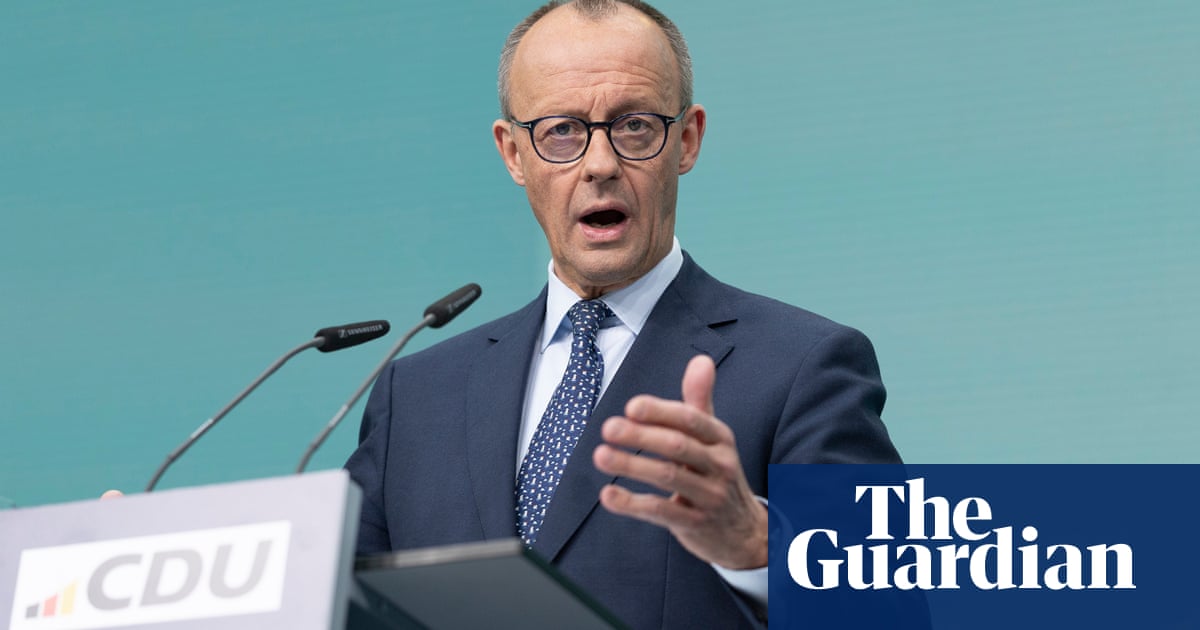Merz strikes urgent tone in calling for more European independence from US

Friedrich Merz marked his conservative alliance’s victory in Germany’s election by urging Europe to make itself more independent from the US – a project that will be music to the ears of Emmanuel Macron but may turn on whether Merz can build a Bundestag majority to lift the so-called debt brake that slows increases in defence spending.
One possibility for the CDU/CSU alliance leader, who is on course to become Germany’s next chancellor, is to claim that the country is in an emergency, to try to force the change through the Bundestag before its dissolution.
The remarks by Merz, a lifelong Atlanticist, show how rapidly European leaders are concluding that Donald Trump’s presidency requires the continent to become more responsible for its own security.
It is true that Angela Merkel, a previous CDU chancellor, speculated in 2017 about a growing distance between the US and Europe after a bruising G7 summit during Trump’s first term. But Merz went much further, telling a television audience on Sunday night about his conversations with European leaders to “strengthen Europe as quickly as possible, so that we achieve independence from the US”.
He added: “After Donald Trump’s remarks last week, it is clear that the Americans, at any case the Americans in this administration, do not care much about the fate of Europe.”
As if to ram home the point, he warned on Monday: “This is really five minutes to midnight for Europe.”
Foreign policy and decisions about defence spending had taken a back seat during the campaign, but Merz struck an urgent tone, saying he was not sure whether the leaders gathering for a Nato summit in June “would still be talking about Nato in its current form or whether we will have to establish an independent European defence capability much more quickly”.
Not surprisingly, given Macron’s longstanding views on European strategic autonomy, the French president was quick to talk up the prospect that the Franco-German engine, which had stalled under the cautious chancellorship of Olaf Scholz, might suddenly be capable of repair.
“We are experiencing a historic moment. It can lead to an unprecedented Franco-German agreement,” Macron said as he flew to Washington to meet Trump on Monday.
Merz and Macron, both natural risk-takers, will want to test where an invigorated partnership could lead.
They will also need to compare notes as to whether the UK, a natural engager with Washington, is starting to conclude its security lies with Europe, and if so, whether some of the Starmer government’s red lines about the single market will have to be removed to kickstart greater European defence cooperation.
Before the election, Merz hinted at his radicalism: “We need to have discussions with both the British and the French – the two European nuclear powers – about whether nuclear sharing, or at least nuclear security from the UK and France, could also apply to us”.
He will also need to make decisions on the supply of Taurus missiles to Ukraine, and on whether joint European defence bonds is an idea worth pursuing. The constraints on EU defence funding will be discussed at a special EU summit on 6 March.
In the short term, it is too much to expect that Germany will offer troops for a proposed European reassurance force in Ukraine. Scholz, now out of the picture, angrily swatted away the idea as premature last week, but Paris and London have been working on joint proposals to deploy troops on the ground, away from the frontline, in the context of a ceasefire.
France believes Lithuania, Finland and Estonia are likely to join this mission, but efforts are also being made to persuade Sweden and the Netherlands. France and the UK believe this force will require a US “backstop”, particularly in terms of transport, intelligence and air cover. So far, the Trump administration has insisted it will not play the backstop role.
On the domestic front, Merz will have to see whether there is a two-thirds majority in the Bundestag to lift the debt brake, a constitutionally enshrined rule that limits Germany’s structural budget deficit to 0.35% of national output.
The same rule applies to creating a special off-balance-sheet fund such as the €100bn (£83bn) pot announced by Scholz in 2022 to fund an overhaul of the German armed forces.
Scholz’s SDP would probably vote to end the brake, as would Die Linke, if it were linked to infrastructure instead of defence spending.
Merz could argue he does not need to lift the brake since he can create the fiscal space through welfare cuts. Alternative für Deutschland, which came second on Sunday with almost 21% of the vote, is opposed to arming Ukraine or adjusting the brake – one of the issues that led to the premature collapse of the previous coalition.
Related
A New Book Argues That What Happens in Europe Doesn’t…
Remaking the World: European Distinctiveness and the Transformation of Politics, Culture, and the Economy by Jerrold Seigel “No issue in world
Poland plans military training for every adult male amid growing…
Poland’s prime minister, Donald Tusk, has said his government is working on a plan to prepare large-scale military training for every adult male in response t
2025 European Athletics Indoor Championships: Ditaji Kambundji secures women’s 60m…
Switzerland’s Ditaji Kambundji walked away from the 2025 European Athletics Indoor Championships in Apeldoorn on 7 March with much more than her first Europea
Takeaways from the EU’s landmark security summit after Trump said…
BRUSSELS (AP) — European Union leaders are trumpeting their endorsement of a plan to free up hundreds of billions of








